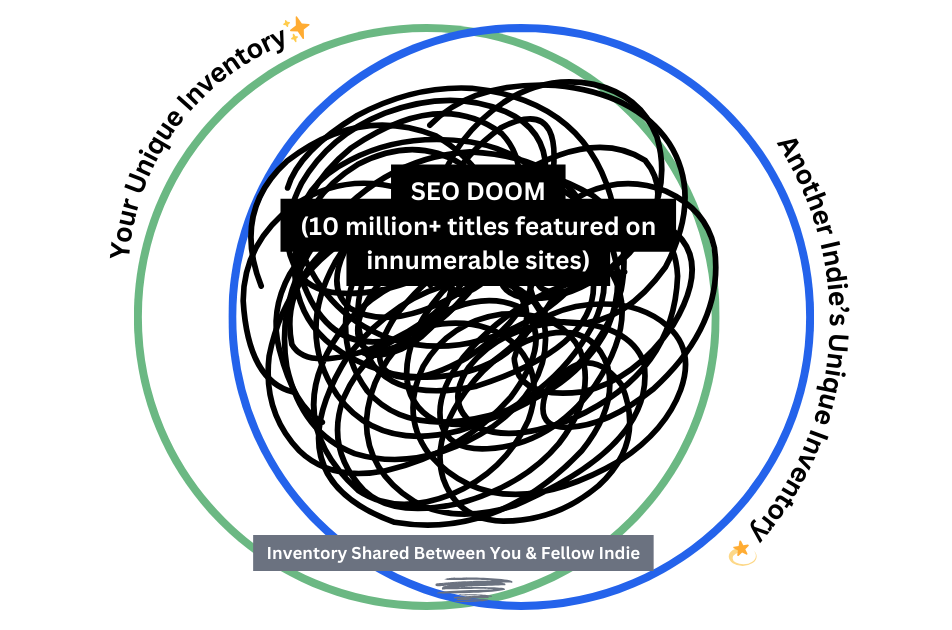Why Listing 10+ Million Books Online Might Be Working Against You
Don’t get me wrong. Being able to sell inventory you don’t have on hand is a good thing, and we have a proposed solution for that, but first hear me out.
Your competitive edge is the inventory on your shelves
Your store’s physical inventory is part of what makes your brand unique. You stock those titles to match the taste of your community, your staff, and yourself. You’ve put in the work tailoring your store’s inventory, creating a unique brand that nobody can compete with. Your speciality in literary fiction or romance or sci-fi or independent presses, your poetry section, your local interest, your local authors, your used and collectible books, your weird and wonderful staff picks, your rare finds…that’s your differentiation.
As Dr. Seuss would say: you’re what makes you, you!
The truth about SEO that booksellers may not realize
There is an unspoken problem with listing 10 million books you don’t have on hand: SEO. When someone Googles “buy a brief history of seven killings marlon james,” what website shows up first? Probably not your bookstore’s e-commerce website, even if you have it in stock. I’ve seen a high profile author who signs books exclusively at one bookstore not rank high for that bookstore, which is a small tragedy.
Why did this happen? Bad SEO. Repeating the same metadata about a book—just like hundreds of other bookstores who use the same catalog for their websites—hurts your search rankings.
SEO is a bit of a black box, but in the context of bookselling, we know that a book’s metadata—author, title, description, etc—is very important. Google uses the information on a book product’s web page for indexing their search results. When your customers search “buy a brief history of seven killings marlon james,” Google searches its unfathomably massive database to find similar matches for that book, based on the metadata for the book.
What happens if everybody else lists those same 10 million titles, and each store uses the exact same metadata from the same database to list your titles? You are competing with hundreds of other independent bookstores for the number one spot in Google, along with Am*zon and other big box stores. And you are losing this SEO battle.
To make it worse, AI is changing the game for SEO, and the marketing industry is still figuring out how this affects their strategy. Now the game is called GEO and it’s a black box too, but with the advent of GEO, high quality, unique information on your website is more valuable than ever.
Inventory reality check

Here’s what the diagram shows: when you list 10+ million books on your website, only a small sliver of products are unique to your store. The grey “Inventory Shared Between You & Fellow Indie” is mostly new releases and popular backlist titles that everyone carries. Most of your SEO competition is fighting with your bookselling friends who list the exact same titles, not the online bookselling nemesis, Am*zon.
But even for those overlapping titles that you have on hand, you can create unique metadata: staff picks, local events, blog posts, signed copies, hand-picked recommendations related to the book, unique photos of your actual copy vs. stock photos, etc.
A problem with a sensible solution
So how do we serve these competing needs: showcase your unique inventory, win at SEO, and still sell books you don’t have on hand? Without sacrificing a bookseller’s most precious resource: your time.
This is the Bookhead dream, what we are working towards, our guiding light. We plan to integrate with services like wholesale catalogs, Bookshop.org’s ebooks, and Libro.fm’s audiobooks to help indies succeed with selling books online. This dream would fit with your bookstore’s e-commerce website, all with the help of Bookhead.
Let Bookshop.org and Libro.fm compete on SEO with Am*zon. Use your website to feature the books you have on hand, like it’s an extension of your brick & mortar. Bookhead will help you do this by syncing your inventory onto your website.
And when a customer searches for a title on your website because it’s not on hand, Bookhead could search the wholesale catalog in the background—similar to how your staff member will tell a customer, “We don’t have that on hand, but we can get that for you.” We haven’t built this part of Bookhead yet, but this is where we are headed. Critically, to solve the repetitive SEO problem, Bookhead would hide those titles from search engines, helping boost Bookshop.org and Libro.fm’s SEO while letting your store’s local inventory shine online.
Bookhead’s vision
This is the vision for Bookhead. We help list your store’s local inventory with enhanced metadata that actually competes, and we could connect your customers to a broader catalog without racing to the SEO bottom against every other indie.
Bookhead is the missing piece to help you compete with Am*zon, not other indies.
